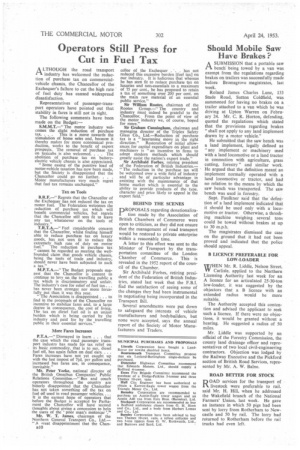Should Mobile Saw Have Brakes ?
Page 44

If you've noticed an error in this article please click here to report it so we can fix it.
ASUBMISSION that a portable saw bench being towed by a van was exempt from the regulations regarding brakes on trailers was successfully made before Bromsgrove magistrates, last week.
Roland James Charles Lune, 133 Stade Road, Sutton Goldfield, was summoned for having no brakes on a trailer attached to a van which he was driving at Upton Warren on February 24. Mr. C. R. Horton, defending, quoted the regulations which stated that the provisions regarding brakes "shall not apply to any land implement drawn by a motor vehicle."
He submitted that the saw bench was a land implement, legally defined as "any implement or machinery used with a land locomotive or a land tractor in connection with agriculture, grass cutting, forestry" and similar work. He argued that the definition meant an implement normally operated with a land locomotive or tractor, and had no relation to the means by which the saw bench was transported. The saw bench was used in forestry. , Supt. Faulkner said that the definition of a land implement indicated that it should be used only with a locomotive or tractor. Otherwise, a threshing machine weighing several tons could be towed without brakes at up to 30 m.p.h.
The magistrates dismissed the case on the ground that it had not been proved and indicated that the police should appeal.
B LICENCE PREFERABLE FOR LOW-LOADER
WHEN Mr. R. Liddle, Nelson Street, Carlisle, applied to the Northern Licensing Authority last week for an A licence for an articulated 25-30-ton low-loader, it was suggested by the objectors that a B licence with an extended radius would be more suitable.
The Authority accepted this contention and advised the applicant to seek such a licence. If there were no objections, it would be granted without a hearing. He suggested a radius of 50 miles.
Mr. Liddle was supported by an official of the Forestry Commission, the county land drainage officer and representatives of two local civil-engineering contractors. Objection was lodged by the Railway Executive and the Pickford section of British Road Services, represented by Mr. A. W. Balne.
ROAD BETTER FOR STOCK
ROAD services for the transport of livestock were preferable to rail. said Mr. H. Hill, when he addressed the Wakefield branch of the National Farmers' Union, last week. He gave an instance in which 50 pigs had been sent by lorry from Rotherham to Newcastle and 50 by rail. The lorry had returned to Rotherham before the rail trucks had even left.




































































































